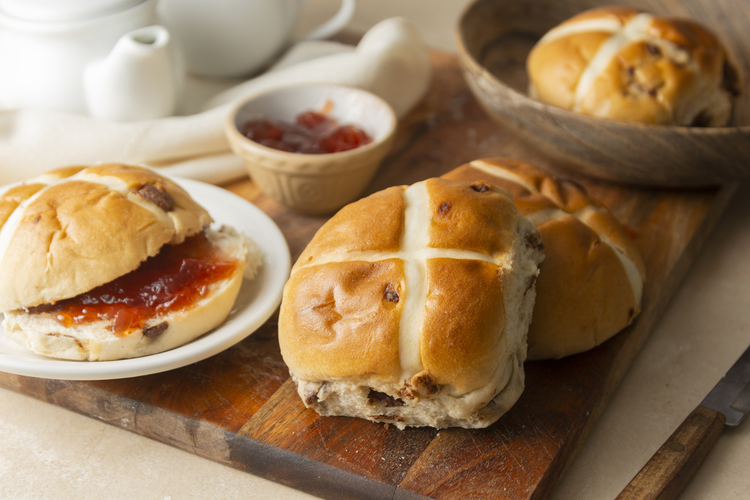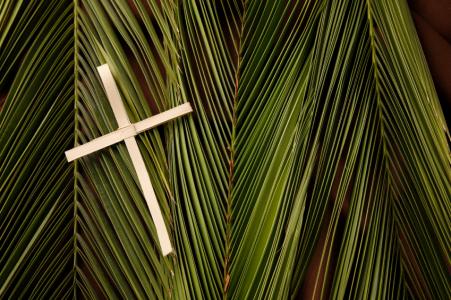
Do You Get a Black Moon?
What is a Black Moon, and why does it happen in December?
Good Friday is a Christian observance which commemorates the crucifixion of Jesus Christ. It is part of Holy week and it is a public holiday throughout the UK.

Hot cross buns are a must on Good Friday.
©iStockphoto.com/Gingagi
Good Friday is a bank holiday in the UK.
It is the day after Maundy Thursday and followed by Holy Saturday and Easter Sunday, but these are not bank holidays. Easter Monday is a bank holiday in England, Northern Ireland, and Wales, but not in Scotland.
The Easter school holiday in the UK is usually around two weeks long, and most schools break up on Good Friday or the day before. However, this varies locally.
Most shops and supermarkets, restaurants, pubs, theatres, and cinemas are open on Good Friday. As Good Friday is a public holiday, most businesses and organizations are closed, although some stay open. Horse racing used to be banned in the UK on Good Friday, but this is no longer the case.
In the past, alcohol sales were restricted during Easter all over the UK, but this is now only the case in Northern Ireland, where alcohol can only be served between 17:00 (5 pm) and 23:00 (11 pm) on Good Friday. On the days before and after, Maundy Thursday and Holy Saturday, the bars in Northern Ireland have to stop serving at midnight. In the neighboring Republic of Ireland, alcohol restrictions were lifted in 2018, after scrapping a 90-year-old law.
Many employees in the UK use some of their annual leave to extend the Easter bank holiday break. Bank holidays may also impact how benefits are paid, but this varies a lot from business to business.
There can be some unusual congestion on the roads because many take trips during the four-day Easter weekend, which starts on Good Friday. Buses, trains, and other public transport systems may run as usual or on a different timetable. British Rail generally schedules railway maintenance during the Easter week, which affects the schedules.
Many Catholics do not eat meat on Fridays, including on Good Friday. Even though most Christians in Britain belong to the Anglican Church of England, this custom has made it common to enjoy an ultra British dish, fish and chips, for tea (dinner) on Good Friday.
Whether you eat fish or meat for your main course, the most common thing on the Good Friday menu in the UK, are hot cross buns. While every family may have their traditional recipe for hot cross buns, they are all made from sweet yeast dough, with currants or other dried fruit and spices like cinnamon.
The top of the bun is decorated with a cross, which was originally made of dough or just a knife imprint. These days, the cross is usually made of yellow, white, or even chocolate frosting. Many split the buns in half, toast them, and spread them with butter, while others prefer to enjoy them as they are.
Traditional
nursery rhyme
These popular buns were possibly enjoyed all year round in the past. However, in 1592, Queen Elizabeth I decreed that hot cross buns could only be sold on Good Friday, at Christmas, or for burials.
People still baked buns, mainly in their kitchens at home. If you were caught, the punishment was to give up all the baked goods to the poor.
There are several theories about the origin of hot cross buns. Some claim they are made in a Christian context, while others say they have pagan, Roman, or Saxon roots.
According to statista.com, 65% of Brits think of chocolate when asked about Easter, while only 12% think of Jesus. A staggering 80 million Easter eggs are sold every year in the UK, and the average child consumes 8 of them. 78% of parents buy Easter eggs for their kids, and 27% of parents admit to eating the chocolate intended for their kids before the traditional egg hunts on Easter Sunday.
Easter is a moveable feast, and Good Friday falls on a different date every year. It is two days before Easter Sunday, which is celebrated on the first Sunday after the first Full Moon on or after the March equinox, but never before March 22.
The Church of England and the Roman Catholic Church both follow the Gregorian Calendar and celebrate Easter on the same dates. A majority of Orthodox churches still follow the Julian Calendar and celebrate Orthodox Good Friday a little later in the spring most years.
As the date for Good Friday can vary from March 20 to April 23, the weather can be dramatically different from one Good Friday to the next. For Britons who stay at home, Good Friday is a day off work in spring. Some use the day to work in their gardens; others take advantage of the Easter weekend to travel. Some go to the Alps for a skiing holiday, while others prefer destinations like Spain or France to enjoy warmer temperatures.
On Good Friday, there is a religious service called the Crucifixion on Victoria Street in London. This is an ecumenical service, meaning that it involves members from several different Christian denominations, and it is open to anyone. There is also a silent procession along Victoria Street, where a wooden cross is carried at the front, in the same way as in many other European cities. The most famous of these processions is the Way of the Cross in Rome, Italy. Tens of thousands of pilgrims from all over the world gather in the ancient city to watch the Pope lead a torchlit procession on Good Friday.
In Christianity, Good Friday is the day Jesus was crucified in Jerusalem. It is a day of mourning, and there are special services to commemorate the crucifixion and suffering of Jesus, also known as the Passion of Christ. In most Anglican churches, there are no flowers or decorations on Good Friday.
It may seem strange that a day of death and suffering is known as “Good” Friday, and there are a number of theories to explain why. The word “Good” may simply be a different spelling or rendering of “God,” or it may have been another, now lost, meaning of “holy.” Another theory is that the tragedy of the crucifixion of Jesus brought great “good” to his followers.
7 holidays with dark histories
On Good Friday, April 10, 1998, the Good Friday Agreement or Belfast Agreement was signed. This was a major step in the political process to end sectarian violence in Northern Ireland. A multi-party agreement by most of Northern Ireland's political parties was signed, as well as an international agreement between the British and Irish governments.
| Year | Weekday | Date | Name | Holiday Type |
|---|---|---|---|---|
| 2019 | Fri | Apr 19 | Good Friday | Bank Holiday |
| 2020 | Fri | Apr 10 | Good Friday | Bank Holiday |
| 2021 | Fri | Apr 2 | Good Friday | Bank Holiday |
| 2022 | Fri | Apr 15 | Good Friday | Bank Holiday |
| 2023 | Fri | Apr 7 | Good Friday | Bank Holiday |
| 2024 | Fri | Mar 29 | Good Friday | Bank Holiday |
| 2025 | Fri | Apr 18 | Good Friday | Bank Holiday |
| 2026 | Fri | Apr 3 | Good Friday | Bank Holiday |
| 2027 | Fri | Mar 26 | Good Friday | Bank Holiday |
| 2028 | Fri | Apr 14 | Good Friday | Bank Holiday |
| 2029 | Fri | Mar 30 | Good Friday | Bank Holiday |
While we diligently research and update our holiday dates, some of the information in the table above may be preliminary. If you find an error, please let us know.

What is a Black Moon, and why does it happen in December?

When will the next comet be visible?

Why do mornings keep getting darker after the December solstice?

Palm Sunday in the United Kingdom celebrates Jesus Christ’s entry into Jerusalem. It is also the Sunday before Easter Sunday.